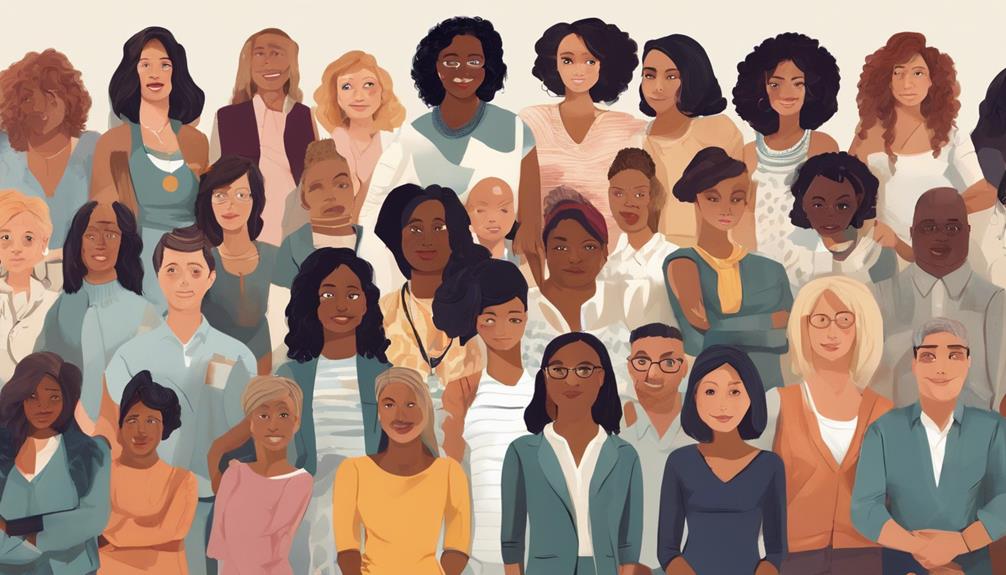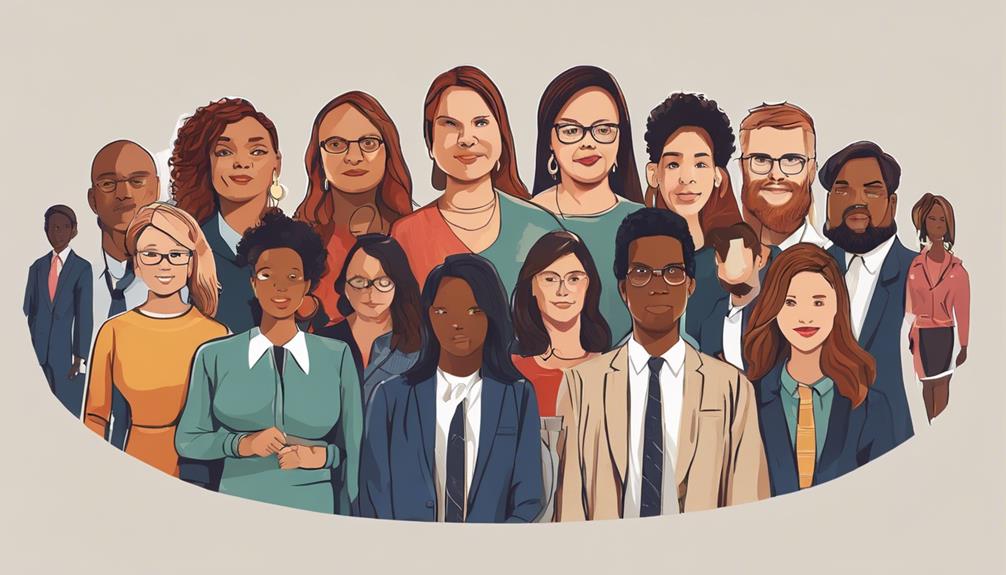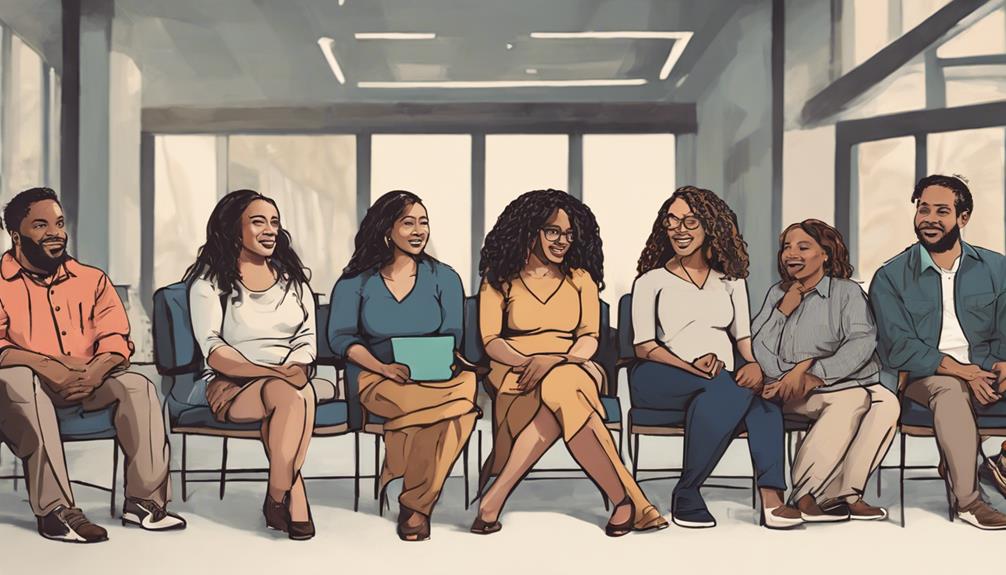As we peel back the layers of discrimination against the childfree community, we uncover a complex web of biases and misconceptions.
The struggles faced by those who choose not to have children extend beyond the workplace, seeping into personal relationships and societal norms.
By shedding light on these challenges and exploring effective strategies for combating prejudice, we can pave the way for a more inclusive and understanding society.
Join us as we unravel the intricacies of this issue and discover how we can work together to dismantle barriers and promote acceptance for all.
Key Takeaways
- Recognize biases and advocate for workplace equality.
- Foster understanding and inclusivity in the workplace.
- Empower childfree individuals to prioritize personal fulfillment.
- Advocate, raise awareness, and build supportive communities for the childfree.
Understanding Childfree Stigma
Understanding childfree stigma involves recognizing the biases and challenges that childfree employees face in the workplace. It's disheartening to acknowledge that discrimination against individuals without children is prevalent, leading to unfair treatment.
Childfree employees often find themselves having to work longer hours and cover for parents, creating feelings of dissatisfaction and conflict. The assumption that childfree individuals are more available for work can result in them being questioned about their personal choice not to have children. Many struggle to address this topic at work due to the sensitivity surrounding it.
To foster a harmonious work environment, it's essential for both parents and childfree coworkers to understand and adapt to each other's needs. By promoting mutual respect and inclusivity, workplaces can create a supportive atmosphere where everyone feels valued and understood.
Recognizing Discriminatory Behaviors

Recognizing discriminatory behaviors in the workplace is crucial for creating a fair and inclusive environment for all employees. It's disheartening to see how childfree employees are often unfairly treated due to assumptions and biases.
From being asked to work longer hours to facing challenges discussing their choice, discriminatory behaviors against childfree individuals are unfortunately prevalent. Employers sometimes prioritize parents' needs over childfree employees, leading to feelings of frustration and inequity.
Denying time off requests, assuming availability for overtime work, and expecting childfree individuals to cover for parents are all forms of discrimination that need to be addressed. These actions not only create tension in the workplace but also contribute to a sense of exclusion and unfair treatment.
Impact of Societal Expectations
Societal expectations often shape workplace dynamics and can significantly impact the treatment of childfree individuals. In our professional lives, childfree adults may find themselves facing unfair demands, such as being asked to work longer hours simply because they're perceived as having more availability. This assumption can lead to unequal treatment in scheduling, time off requests, and workload distribution. The societal norm of prioritizing parenthood can inadvertently marginalize those who've chosen not to have children, creating an atmosphere where special treatment for parents is expected while childfree individuals are left feeling undervalued.
Navigating these expectations can be challenging for childfree employees, as they strive to assert their boundaries and advocate for fair treatment in the workplace. By shedding light on these issues and fostering a culture of mutual understanding, respect, and equal opportunities, we can work towards overcoming discrimination against the childfree community. It's essential for organizations to recognize and address these biases to create a more inclusive and supportive environment for all employees.
Strategies for Responding Assertively

In order to effectively address discrimination against the childfree community in the workplace, implementing assertive strategies is key to advocating for fair treatment and fostering a more inclusive environment.
When responding assertively to discrimination, childfree individuals can:
- Clearly Communicate Boundaries: Expressing boundaries regarding personal choices and family planning decisions can help set expectations and prevent misunderstandings in the workplace.
- Advocate for Equal Opportunities: Asserting the right to equal opportunities and fair treatment can challenge discriminatory practices and promote a more equitable work environment for all employees.
- Educate Others: Taking the time to educate colleagues and supervisors about the childfree lifestyle can help dispel misconceptions and foster a more supportive and understanding workplace culture.
Building Supportive Communities
To foster a sense of belonging and mutual support, childfree individuals can actively engage in building communities that provide emotional validation and resources. Supportive communities play a vital role in offering a safe space for childfree people to connect, share their experiences, and feel understood.
These communities offer not only emotional support but also validation for those who often face discrimination or judgment for their decision to remain childfree. By coming together in supportive environments, childfree individuals can find solidarity, empowerment, and a platform to challenge stereotypes and stigmas surrounding their lifestyle.
These communities go beyond just offering emotional support; they also provide valuable resources, information, and advocacy to promote fair treatment and equal opportunities in society. Through building and participating in these supportive communities, childfree individuals can combat isolation, establish networks, and raise awareness about the childfree lifestyle, ultimately creating a stronger and more inclusive community for all.
Advocating for Workplace Equality

Childfree employees face disparities in workplace policies and treatment due to assumptions and biases favoring parents. Advocacy for workplace equality is crucial to combat discriminatory practices and ensure fair treatment for all employees.
Here are three key ways we can advocate for a more inclusive work environment:
- Challenging Assumptions: We need to challenge the notion that childfree individuals are more available for overtime or less deserving of flexible work policies. By addressing these assumptions, we can promote a fairer distribution of workload and opportunities.
- Promoting Equal Opportunities: It's essential to advocate for equal opportunities in terms of time off, leave policies, and benefits. This includes ensuring that childfree employees aren't disadvantaged compared to parents when requesting time off or planning vacations.
- Advocacy and Education: By actively advocating against discriminatory practices and educating others about the challenges faced by the childfree community, we can work towards a more inclusive workplace where everyone feels valued and supported.
Addressing Family Pressures

Facing societal and familial pressures, childfree individuals often grapple with expectations that challenge their decision to remain without children. It's not uncommon for family members to exert family pressure on us to conform to traditional norms by having children. These pressures can be overwhelming, leading to strained relationships and feelings of guilt or inadequacy.
It's essential for us to set boundaries with our families to assert our autonomy and stand firm in our decision to be childfree. Family pressure can be difficult to navigate, but by clearly communicating our choices and boundaries, we can help our loved ones understand and respect our decision.
Challenging Stereotypes and Myths

Challenging misconceptions and false assumptions about the childfree lifestyle is essential in promoting understanding and respect for individual choices.
Here are three key points to consider when challenging stereotypes and myths about childfree women and the concept of legacy:
- Childfree Women: Society often assumes that a woman's ultimate goal should be motherhood, but choosing not to have children doesn't diminish her worth or purpose. Childfree women lead fulfilling lives, pursuing their passions, careers, and personal growth without the desire for motherhood.
- Legacy: Legacy isn't solely defined by offspring. Choosing not to have children doesn't mean sacrificing the opportunity to leave a lasting impact. Through philanthropy, mentorship, creativity, or activism, childfree individuals can create a meaningful legacy that reflects their values and beliefs.
- Personal Happiness: The decision to be childfree is deeply personal and valid. It's about prioritizing one's happiness and well-being, free from societal expectations or judgments. Embracing the childfree lifestyle allows individuals to focus on self-fulfillment and creating a life that brings them joy.
Legal Protections for Childfree Individuals

In light of the absence of federal anti-discrimination protections, the legal landscape for individuals without children remains uncertain and lacking in clear safeguards. Childfree individuals aren't specifically protected under current U.S. federal anti-discrimination laws, leaving them vulnerable to discrimination without legal recourse.
Discrimination based on one's choice to be childfree is often overlooked in workplace policies and legal frameworks, leading to bias, stereotypes, and unequal treatment.
Legal protections for childfree individuals vary by state and are generally limited in scope. While some states may offer some safeguards against discrimination in certain contexts like employment, overall, there's a lack of comprehensive protection. This gap in legal coverage leaves childfree individuals susceptible to mistreatment without avenues for justice or redress.
Addressing the need for legal protections against discrimination for the childfree community is crucial to ensuring fairness and equality in society. Advocating for inclusive policies and legislation that recognize and prevent discrimination based on reproductive choices is essential for creating a more equitable environment for all individuals, regardless of their decision to have children.
Educating Others on Respectful Discourse

To foster a more inclusive workplace environment, we prioritize educating others on respectful discourse between parents and childfree individuals. This education is crucial for promoting understanding and empathy among colleagues with different life choices. By engaging in respectful discourse, we aim to address biases and stereotypes that may exist and create a supportive environment for all employees.
Here are three key ways we approach educating others on respectful communication:
- Open Dialogue: Encouraging open and constructive dialogue allows for a deeper understanding of the challenges and experiences faced by both parents and childfree individuals in the workplace.
- Empathy Building: Education on respectful discourse helps build empathy among colleagues, fostering a culture of mutual respect and appreciation for diverse perspectives.
- Inclusivity Promotion: By promoting respectful communication, we work towards eliminating discrimination and ensuring equal treatment for all employees, regardless of their parental status.
Promoting Inclusivity in Social Circles

Promoting inclusivity in social circles involves acknowledging and respecting individuals' choices regarding parenthood. Creating an environment that embraces both parents and childfree individuals is essential for fostering genuine connections and understanding. By valuing diverse life choices, we can cultivate a sense of belonging for everyone in our social circles. Let's take a look at how we can work towards creating an inclusive environment:
| Steps to Promote Inclusivity | Description | Benefits |
|---|---|---|
| Encourage open dialogue | Create space for honest conversations | Fosters understanding and empathy |
| Embrace different perspectives | Celebrate the uniqueness of each individual | Promotes acceptance and respect |
| Value contributions from all | Recognize the strengths each person brings | Cultivates a sense of community |
| Support diverse choices | Respect decisions regarding parenthood | Builds a more inclusive environment |
Celebrating Diverse Life Choices

We believe in celebrating diverse life choices by embracing personal freedom, respecting individual decisions, and fostering inclusivity together.
Each person's path is unique, and honoring these differences strengthens our communities.
Together, we can create a culture that values autonomy and supports individuals in living authentically.
Embracing Personal Freedom
Embracing personal freedom involves acknowledging and celebrating the diverse life choices made by individuals, including the decision to be childfree.
- Personal Autonomy: Making decisions about having children is a deeply personal choice that should be respected without judgment.
- Diverse Life Choices: Legacy can be built in various ways, not just through parenthood, highlighting the beauty of diverse paths.
- Validation of Choices: Reasons for not desiring children are valid and should be honored, emphasizing the importance of respecting individual decisions.
Respecting Individual Decisions
Acknowledging the diverse paths individuals choose in life, we recognize the importance of respecting personal decisions, including the choice to be childfree. Criticism towards childfree individuals often stems from misconceptions or societal pressures rather than understanding the individual's personal reasons. Each person's decision regarding children is deeply personal and should be honored without judgment. To illustrate the beauty of diverse life choices, here is a glimpse into the varied ways individuals leave a lasting impact:
| Legacy Building | Description | Impact |
|---|---|---|
| Creative Pursuits | Expressing oneself through art, music, or writing | Leaves a mark on culture and inspires others |
| Environmental Advocacy | Working towards a sustainable future | Preserves the planet for future generations |
| Mentorship | Guiding and supporting younger individuals | Shapes future leaders and communities |
These examples showcase how diverse paths can lead to meaningful legacies, highlighting the importance of respecting individual decisions.
Fostering Inclusivity Together
In fostering inclusivity together, we celebrate the diverse life choices individuals make. By respecting diverse life choices, we create a harmonious workplace culture that values everyone's decisions equally. To achieve this, we must:
- Acknowledge Differences: Recognize and appreciate that people have various paths and priorities in life, including whether or not to have children.
- Encourage Open Dialogue: Foster conversations where individuals feel comfortable sharing their perspectives without fear of judgment, promoting understanding and empathy.
- Promote Mutual Respect: Emphasize the importance of respecting each other's decisions, whether related to parenthood or other personal choices, to cultivate a supportive and inclusive environment.
Through these actions, we can build a more inclusive society that celebrates diversity in life choices.
Frequently Asked Questions
How Can We Overcome Childlessness?
We can overcome childlessness by embracing diverse perspectives and supporting individual choices. By recognizing that not everyone desires parenthood, we create a more inclusive environment.
Understanding and respecting different life paths lead to a more compassionate society. Let's celebrate the richness that comes from various life choices and work towards a world where everyone feels valued regardless of their decision to have children.
Can You Discriminate Against Someone for Not Having Kids?
Absolutely, discriminating against someone for not having kids is unjust. It's crucial to recognize that personal choices, such as being childfree, should never be a basis for mistreatment or bias. Everyone deserves respect and fair treatment, regardless of their decision to have children or not.
We must strive to create a workplace environment where all individuals feel valued and included, free from discrimination based on their family status.
How Do You Accept You'll Never Have Children?
We accept not having children by acknowledging our desires and embracing the path we've chosen. It involves finding fulfillment in personal goals and understanding that leaving a legacy can be achieved in various ways.
By challenging societal norms and building a supportive community, we validate our decision to be childfree. It's about respecting our choice and not succumbing to external pressures or expectations. We prioritize our personal growth, relationships, and wellbeing, recognizing that parenthood is not the only path to fulfillment. By exploring ways to avoid becoming a mombie—someone overwhelmed by the demands of parenting and losing their sense of self—we emphasize nurturing our own happiness and mental health. It’s about cultivating a life that aligns with our values, free from the societal belief that child-rearing is a necessary step to a complete life.
Embracing our childfree lifestyle brings freedom and empowerment.
How Many People Regret Not Having Kids?
We've found that a small percentage, around 6%, express regret about not having kids. Interestingly, men tend to voice this regret more than women.
Factors like societal pressures and fear of loneliness can play a role. However, many of us have made a deliberate and content choice to remain childfree.
It's important to acknowledge that not having children can lead to fulfilling and meaningful lives for many of us.
Conclusion
In conclusion, it's essential for us to challenge discrimination against the childfree community in all aspects of society.
Did you know that a study found that childfree individuals are more likely to face negative stereotypes and assumptions in the workplace compared to parents?
By promoting understanding, respect, and inclusivity, we can create a more accepting and supportive environment for everyone, regardless of their choice to have children or not.
Let's work together to overcome these societal challenges and celebrate diverse life choices.
Augustus is the visionary leader and Editor-in-Chief of Personality-Test.net. With an unwavering commitment to quality and authenticity, he oversees all content, ensuring it enlightens and empowers our audience. Augustus believes deeply in the transformative power of self-awareness and is dedicated to making Personality-Test.net a beacon for those on a journey to understand themselves better.










